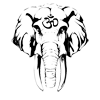German Indologist
Was a German Indologist and professor of Philosophy at University of Kiel.
Strongly influenced by Arthur Schopenhauer, Deussen was a friend of Friedrich Nietzsche and Swami Vivekananda.
In 1911, he founded the Schopenhauer Society (Schopenhauer-Gesellschaft). Professor Deussen was the first editor, in 1912, of the scholarly journal Schopenhauer Yearbook (Schopenhauer-Jahrbuch).
Deussen, who Sanskritised his name to "Deva-Sena"as a mark of his admiration for Hinduism, is one of the distinguished roll of Europeans who — often with lyrical admiration — participated in the
scholarly Western discovery of Sanskrit and Hinduism that took place in British India itself, Germany, France and England.
Paul Deussen was born in 1845 in Oberdreis in the Rhine Province, one of eight children of a clergyman of modest means. He became a student, and lifelong devotee, of the German philosopher Schopenhauer, and of the philosophy of Kant; and he became a friend of Friedrich Nietzsche. Deussen was educated at Bonn, Tübingen and Berlin Universities between 1864 and 1881, writing his dissertation on Plato’s philosophy. Deussen was appointed Privatdocent (1881-7) and Extraordinarius (1887-9) at the university of Berlin, and Ordinarius (1889–1919, the year of his death), at the University of Kiel. Until 1919, Deussen continued to edit the Schopenhauer Yearbook, as well as working on an edition of Schopenhauer’s works.
It was when he attended a lecture by Professor Lassen expounding the Shakuntala that Deussen was fired by Sanskrit and Hinduism. His first publication in 1877 was published in English as The Elements of Metaphysics in 1894. It was followed by the translations of The Sutra of the Vedanta in 1906; The Philosophy of the Upanishads also in 1906; and The System of the Vedanta in 1912. His visit to India in 1904 was published in English as My Indian Reminiscences in 1912. However, his autobiographical papers, edited by his widow Erica and published in German in 1922, have not so far been translated into English.
Deussen’s System of the Vedanta has been reprinted several times: he uses the Brahmasutra and – rather less — Adi Shankara’s commentary on it, as the structure for his exposition.





